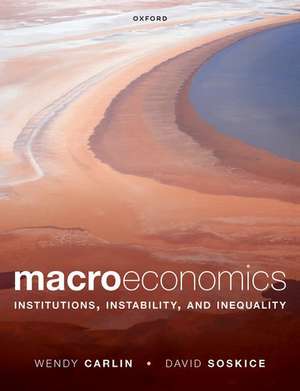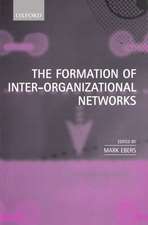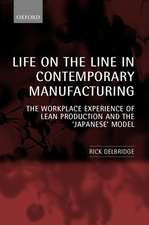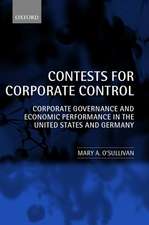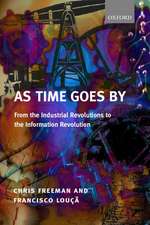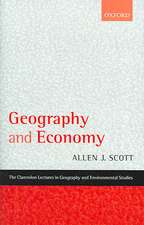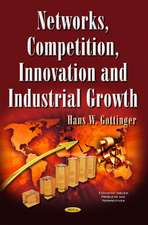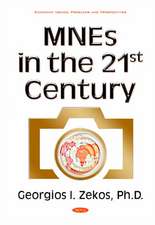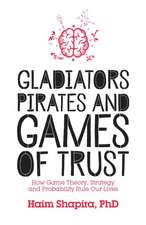Macroeconomics: Institutions, Instability, and Inequality
Autor Wendy Carlin, David Soskiceen Limba Engleză Paperback – 29 ian 2024
Toate formatele și edițiile
| Toate formatele și edițiile | Preț | Express |
|---|---|---|
| Paperback (3) | 391.43 lei 10-17 zile | +107.37 lei 6-12 zile |
| OUP OXFORD – 29 ian 2024 | 391.43 lei 10-17 zile | +107.37 lei 6-12 zile |
| OUP OXFORD – 20 noi 2014 | 476.05 lei 10-17 zile | +104.21 lei 6-12 zile |
| OUP OXFORD – 15 dec 2005 | 521.35 lei 10-17 zile | +108.54 lei 6-12 zile |
Preț: 391.43 lei
Preț vechi: 462.67 lei
-15% Nou
Puncte Express: 587
Preț estimativ în valută:
74.90€ • 78.20$ • 61.99£
74.90€ • 78.20$ • 61.99£
Carte disponibilă
Livrare economică 03-10 martie
Livrare express 27 februarie-05 martie pentru 117.36 lei
Preluare comenzi: 021 569.72.76
Specificații
ISBN-13: 9780198838661
ISBN-10: 0198838662
Pagini: 1024
Dimensiuni: 190 x 245 x 40 mm
Greutate: 1.93 kg
Ediția:2
Editura: OUP OXFORD
Colecția OUP Oxford
Locul publicării:Oxford, United Kingdom
ISBN-10: 0198838662
Pagini: 1024
Dimensiuni: 190 x 245 x 40 mm
Greutate: 1.93 kg
Ediția:2
Editura: OUP OXFORD
Colecția OUP Oxford
Locul publicării:Oxford, United Kingdom
Recenzii
This enlightening book is a wonderful guide to the key topics of macroeconomics: inflation, monetary policy, including at the zero lower bound, growth and innovation, inequality, exchange rates and more. Very closely connected to the real world, Carlin and Soskice's book brings a wealth of data and historical examples into the discussion in a very pedagogical way. It covers extremely well the links between risk taking, financial cycles and crises which are at the heart of our modern economies. It has also an essential and very timely chapter on commodity price shocks. This is what macroeconomics is about: first order questions, affecting the lives of billions of people, clear modelling and rigorous thinking informed by data and history. Very exciting!
This wonderful textbook achieves a rare feat: the material is consistent with work at the current research frontier but nevertheless remains highly accessible. I first learned macroeconomics from an earlier volume of this textbook, when I was an undergraduate student twenty years ago. Now as then the core of the book is its simple 3-equation model for studying business cycles and stabilization policy. But this latest volume also takes on board many of the key developments over the last two decades. Specifically, this is the first textbook to integrate the lessons of the exploding literature on heterogeneous-agent macroeconomics and of the new HANK models. As Carlin and Soskice write: "it's time for 'inequality' to have a place in the title of a macroeconomics textbook" - I couldn't agree more!
Beautifully written and rich in data and historical examples, 'Macroeconomics' sets out the building blocks of macroeconomic modelling and guides readers to the frontier of the discipline. The book underscores the crucial role played by institutions, inequality and innovation in contemporary economies. Once you start reading it, you cannot stop it!
Carlin and Soskice have written a masterful treatise on modern macroeconomics. The authors bring to life the fundamental importance of balance for the healthy functioning of an economy - not only the balance between supply and demand, but also in terms of equitable distribution of income. They carefully walk us through when finance is useful, and when its excesses can be harmful for the economy. Most importantly, the authors explain why institutions, i.e. the manner in which a society chooses to govern itself, are central to how far an economy prospers.
Wendy Carlin and David Soskice have once more achieved a pedagogical tour de force, bringing frontier research to the undergraduate level. The increased focus on inequality, its sources and its implications, is a particularly welcome addition.
This remarkable new macroeconomics text brings upper-level undergraduates to the frontier of research and policy. The exposition is at the same time accessible, engaging, and relevant to current concerns about the broad consequences of policies -- intended and unintended. The book's attention to historical and institutional context, as well as its treatment of innovation and technical change, set it apart from other textbooks at this level.
Austerity, financial crises, quantitative easing, artificial intelligence: this book has it all. A macroeconomics text that explains the data and logic that policymakers really do use. Read this book and understand the world.
This is the only undergraduate macroeconomics textbook that weaves a serious treatment of inequality into a core three-equation model, and, at the same time, it also includes an unparalleled introduction to incorporating the financial system in this framework. As such, it marks a serious departure from most macroeconomics textbooks, which tend to relegate distribution and finance to the secondary status of extensions or special topics. The accompanying simulation tool also makes the book exceptionally classroom friendly, not only by providing instructors a visual way to summarize comparative statics, but also by giving students a tool with which they can independently explore extensions of classroom discussions.
Economics students want to understand the world we live in, and no other macroeconomics textbook satisfies this desire to engage with the world's most significant issues quite like Carlin and Soskice. With its intuitive, tractable, and realistic approach, their textbook equips students to easily comprehend even the most complex macroeconomic concepts and their relationship to real-world problems like inequality and economic shocks. The 3-equation model helps students grasp how economic shocks affect the economy, while the new book's analysis of inequality gives a more thorough understanding of how policy responses can impact people's lives. The book equips the next generation of economics graduates to make a meaningful impact in the world. The new book also links to the CORE Econ Project, enabling programme leaders to create a more integrated curriculum in macroeconomics across years.
The coverage on environmental and social sustainability of production is much appreciated.
Employers value graduates comfortable to deal with real world issues, using appropriate theory and data skills. Using this textbook will be an ideal way to foster such a graduate.
Carlin and Soskice offer a clear, balanced, engaging, and forward-looking perspective on a wide range of topics, from short-term monetary policy to growth & innovation. Students will appreciate the authors' crystal-clear exposition, along with the careful balance of technical detail and intuitive real-world examples presented.
The book's development and applications of the 3-equation model make it easy to introduce students to more advanced theoretical ideas and current policy issues. It is straightforward to pick chunks of the book and incorporate other material. Resources provided to instructors and students are very helpful.
This wonderful textbook achieves a rare feat: the material is consistent with work at the current research frontier but nevertheless remains highly accessible. I first learned macroeconomics from an earlier volume of this textbook, when I was an undergraduate student twenty years ago. Now as then the core of the book is its simple 3-equation model for studying business cycles and stabilization policy. But this latest volume also takes on board many of the key developments over the last two decades. Specifically, this is the first textbook to integrate the lessons of the exploding literature on heterogeneous-agent macroeconomics and of the new HANK models. As Carlin and Soskice write: "it's time for 'inequality' to have a place in the title of a macroeconomics textbook" - I couldn't agree more!
Beautifully written and rich in data and historical examples, 'Macroeconomics' sets out the building blocks of macroeconomic modelling and guides readers to the frontier of the discipline. The book underscores the crucial role played by institutions, inequality and innovation in contemporary economies. Once you start reading it, you cannot stop it!
Carlin and Soskice have written a masterful treatise on modern macroeconomics. The authors bring to life the fundamental importance of balance for the healthy functioning of an economy - not only the balance between supply and demand, but also in terms of equitable distribution of income. They carefully walk us through when finance is useful, and when its excesses can be harmful for the economy. Most importantly, the authors explain why institutions, i.e. the manner in which a society chooses to govern itself, are central to how far an economy prospers.
Wendy Carlin and David Soskice have once more achieved a pedagogical tour de force, bringing frontier research to the undergraduate level. The increased focus on inequality, its sources and its implications, is a particularly welcome addition.
This remarkable new macroeconomics text brings upper-level undergraduates to the frontier of research and policy. The exposition is at the same time accessible, engaging, and relevant to current concerns about the broad consequences of policies -- intended and unintended. The book's attention to historical and institutional context, as well as its treatment of innovation and technical change, set it apart from other textbooks at this level.
Austerity, financial crises, quantitative easing, artificial intelligence: this book has it all. A macroeconomics text that explains the data and logic that policymakers really do use. Read this book and understand the world.
This is the only undergraduate macroeconomics textbook that weaves a serious treatment of inequality into a core three-equation model, and, at the same time, it also includes an unparalleled introduction to incorporating the financial system in this framework. As such, it marks a serious departure from most macroeconomics textbooks, which tend to relegate distribution and finance to the secondary status of extensions or special topics. The accompanying simulation tool also makes the book exceptionally classroom friendly, not only by providing instructors a visual way to summarize comparative statics, but also by giving students a tool with which they can independently explore extensions of classroom discussions.
Economics students want to understand the world we live in, and no other macroeconomics textbook satisfies this desire to engage with the world's most significant issues quite like Carlin and Soskice. With its intuitive, tractable, and realistic approach, their textbook equips students to easily comprehend even the most complex macroeconomic concepts and their relationship to real-world problems like inequality and economic shocks. The 3-equation model helps students grasp how economic shocks affect the economy, while the new book's analysis of inequality gives a more thorough understanding of how policy responses can impact people's lives. The book equips the next generation of economics graduates to make a meaningful impact in the world. The new book also links to the CORE Econ Project, enabling programme leaders to create a more integrated curriculum in macroeconomics across years.
The coverage on environmental and social sustainability of production is much appreciated.
Employers value graduates comfortable to deal with real world issues, using appropriate theory and data skills. Using this textbook will be an ideal way to foster such a graduate.
Carlin and Soskice offer a clear, balanced, engaging, and forward-looking perspective on a wide range of topics, from short-term monetary policy to growth & innovation. Students will appreciate the authors' crystal-clear exposition, along with the careful balance of technical detail and intuitive real-world examples presented.
The book's development and applications of the 3-equation model make it easy to introduce students to more advanced theoretical ideas and current policy issues. It is straightforward to pick chunks of the book and incorporate other material. Resources provided to instructors and students are very helpful.
Notă biografică
Wendy Carlin is Professor of Economics at University College London, Fellow of the CEPR, Fellow of the British Academy, and External Professor at the Santa Fe Institute. She directs the CORE Econ project - www.core-econ.org - and is Co-Director of the James M. and Cathleen D. Centre on Wealth Concentration, Inequality, and the Economy at University College London.David Soskice FBA is Emeritus Professor at The London School of Economics and Political Science.
